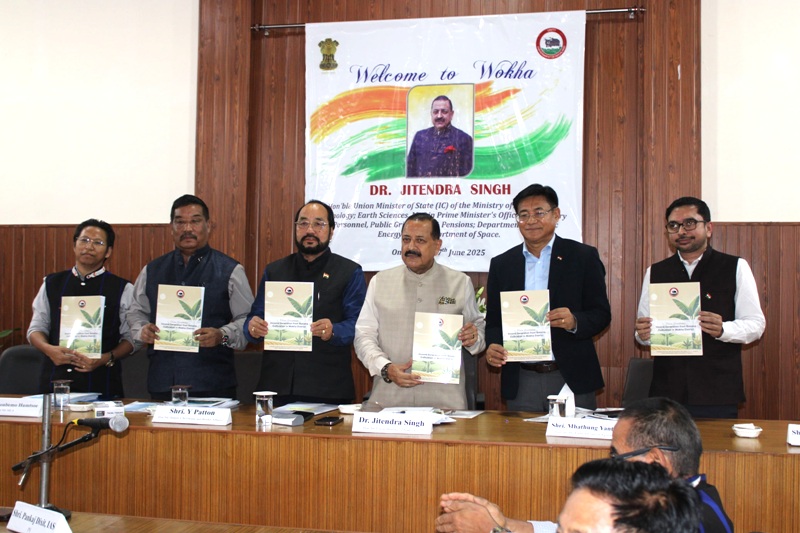THURSDAY, JUNE 19, 2025
- Home
- MoS Jitendra Singh unveils vision document on banana cultivation in Wokha
MoS Jitendra Singh unveils vision document on banana cultivation in Wokha
Union Minister of State Dr. Jitendra Singh, on Monday launched a vision document on ‘Income generation from banana cultivation in Wokha district.
Published on Jun 16, 2025
By EMN
Share

DIMAPUR — In a significant step toward enhancing agricultural income and regional development, Union Minister of State (independent charge) for Science and Technology and Earth Sciences, Dr. Jitendra Singh, on Monday launched a vision document on ‘Income generation from banana cultivation in Wokha district during his official visit to the district.
According to a DIPR report, the MoS was accompanied by the four elected legislators from Wokha district—Deputy Chief Minister Y Patton, Advisor Mhathung Yanthan and MLAs YM Humtsoe and Achumbemo Kikon.
The minister’s visit was aimed at understanding grassroots challenges faced by the people in Wokha and the broader Northeastern region.
Addressing a public gathering, Singh acknowledged the developmental gaps between the Northeast and other parts of India and stated that the region has witnessed transformative changes over the past decade.
He highlighted the growth in industrial engagement and job creation, noting that increased private sector interest has opened up new opportunities for youth.
Also read: Wokha legislators submit representation to Union Minister Jitendra Singh
On inter-state matters, he said the central government is actively working to address the Nagaland-Assam border issues using advanced space technology and satellite imaging to reach a long-term, peaceful resolution.
Dr. Singh expressed concern over rising drug abuse and urged Wokha's civil bodies to follow Mizoram's model, where community-led initiatives have been effective in tackling the issue.
On environmental and wildlife challenges, the minister acknowledged the rising human-elephant conflict in Wokha and assured that a central-level meeting will soon be convened to explore concrete solutions.
Singh emphasised diversifying farming practices, particularly banana cultivation, given the district's 'One District One Product' focus. He noted that leveraging banana farming's potential could boost household incomes and spur local economic growth.
Speaking on regional infrastructure and development, he expressed concern over the lack of technology support and underscored the importance of socio-economic transformation. He affirmed that the purpose of his visit was to identify challenges firsthand—ranging from healthcare and education to connectivity and infrastructure—and to ensure that these are addressed with timely interventions and central assistance.
Deputy Commissioner Vineet Kumar outlined Wokha district's profile, highlighting strengths like literacy and agriculture, while also underscoring pressing issues such as poor connectivity, infrastructure gaps, border disputes, water scarcity, human-elephant conflict, and substance abuse.
The programme also featured speeches by key community leaders including the chairman of Lotha Hoho, president of Eloe Hoho and president of Lotha Students’ Union. The civil society representatives reiterated the community’s commitment to progress and appealed for greater governmental support.
Representatives from various departments, including PHED, Health, Rural Development, Industries, Agriculture, Education, Horticulture, Fisheries, and Food & Civil Supplies, presented their progress, highlighted challenges, and emphasised the need for better coordination and funding to effectively implement government schemes.
The Union minister’s visit underscored the Centre's commitment to inclusive development, shining a spotlight on Wokha District and the Northeast region.
“By launching the Vision Document on banana cultivation and engaging directly with departmental officials, civil society leaders, and the public, Dr. Singh not only reinforced the district’s economic potential but also addressed pressing concerns ranging from infrastructure gaps and environmental conflicts to border issues and youth employment,” the report added.

